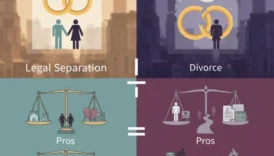Sole Proprietorship vs LLC: Legal Structure Explained

When starting a business, one of the most important decisions is choosing its legal structure. Two of the most common options for small business owners are the Sole Proprietorship and the Limited Liability Company (LLC). While both can work for entrepreneurs, they differ in how they handle liability, taxation, and management. Understanding these differences helps business owners select the structure that best fits their goals, resources, and risk tolerance.
What Is a Sole Proprietorship?
A sole proprietorship is the simplest business structure where one individual owns and operates the business, and there is no legal distinction between the owner and the business itself. This means the owner is personally responsible for all debts, liabilities, and profits of the business.

In more detail, a sole proprietorship is often chosen by freelancers, consultants, or small shop owners because it requires minimal paperwork and has low startup costs. The owner reports business income and expenses directly on their personal tax return, which makes accounting straightforward. However, the lack of separation between personal and business liability means the owner’s personal assets—such as savings, cars, or even a home—can be at risk if the business faces lawsuits or debt.
Key Features of a Sole Proprietorship
- Full control – The owner makes all decisions without needing to consult partners or shareholders.
- Pass-through taxation – Business profits are taxed as personal income.
- Unlimited personal liability – The owner is fully responsible for all debts and obligations.
- Ease of setup – Often requires little more than registering a business name and obtaining permits.
Example Scenario
Imagine a freelance graphic designer who starts working under their own name. They don’t create a separate legal entity, so the business is automatically treated as a sole proprietorship. They enjoy full control and easy tax reporting, but if a client sues over a contract dispute, their personal savings could be used to cover damages.
What Is an LLC (Limited Liability Company)?
A Limited Liability Company (LLC) is a business structure that creates a separate legal entity from its owners, providing liability protection while still offering flexible management and tax options. This means the personal assets of the owners (called members) are generally shielded from the company’s debts and legal obligations.

In practice, an LLC combines the liability protection of a corporation with the simplicity and flexibility of a sole proprietorship or partnership. Owners can choose how they want the business to be taxed—either as a pass-through entity (like a sole proprietorship) or as a corporation. This flexibility makes LLCs especially popular among small and medium-sized business owners who want to limit risk without dealing with the complex formalities of a corporation.
Key Features of an LLC
- Limited liability – Members are not personally responsible for most business debts or lawsuits.
- Flexible taxation – Can be taxed as a sole proprietorship, partnership, or corporation.
- Separate legal identity – The LLC can own property, enter contracts, and sue or be sued in its own name.
- Customizable management – Members can manage the company directly or appoint managers.
Example Scenario
Consider two friends who open a small restaurant together. By forming an LLC, they protect their personal assets in case the restaurant faces lawsuits or debt. If the business struggles financially, creditors can go after the LLC’s assets but not the owners’ homes or savings.
Key Differences Between Sole Proprietorship and LLC
The main difference between a sole proprietorship and an LLC is that a sole proprietorship does not create a separate legal entity, while an LLC does—meaning LLC owners have personal liability protection, but sole proprietors do not. This fundamental distinction affects liability, taxation, setup requirements, and long-term business planning.
Detailed Comparison
- Legal Status
- Sole Proprietorship: The business and the owner are legally the same.
- LLC: The business exists as its own legal entity, separate from its owners.
- Liability
- Sole Proprietorship: The owner is personally liable for all debts and lawsuits.
- LLC: Owners (members) are generally shielded from personal liability, protecting personal assets.
- Taxation
- Sole Proprietorship: Income is reported on the owner’s personal tax return (pass-through taxation).
- LLC: By default, also pass-through taxation, but can elect to be taxed as a corporation for strategic benefits.
- Setup and Costs
- Sole Proprietorship: Easiest and cheapest to form; usually just requires a business name registration and permits.
- LLC: Requires filing articles of organization, paying state fees, and sometimes annual reports.
- Management
- Sole Proprietorship: The owner has full control over all decisions.
- LLC: Can be managed by members or appointed managers, offering flexibility.
Example Contrast
- A freelance web developer operating as a sole proprietor has complete control and minimal paperwork, but risks losing personal assets in a lawsuit.
- A landscaping company formed as an LLC may face more administrative tasks, but the owners enjoy protection from personal liability if the business incurs debt.
In short, sole proprietorship is simple but risky, while LLC provides protection with added complexity and costs.
Liability Protection: Personal vs Business Risk
The most critical difference between a sole proprietorship and an LLC is how they handle liability. In a sole proprietorship, the owner is personally responsible for all debts and legal claims, while an LLC separates personal assets from business obligations, protecting the owners from most business-related risks.
Sole Proprietorship Liability
- The owner and the business are legally the same entity.
- Creditors can pursue the owner’s personal assets—bank accounts, home, or car—to satisfy business debts.
- A lawsuit against the business is effectively a lawsuit against the owner.
- While simple to operate, this structure carries unlimited personal risk.
LLC Liability
- The LLC is a separate legal entity from its members.
- Owners’ personal assets are generally shielded from lawsuits or debts of the business.
- Exceptions exist if the owners engage in fraud, commingle personal and business funds, or personally guarantee a loan.
- This protection, known as the “corporate veil,” is one of the biggest reasons entrepreneurs choose LLCs over sole proprietorships.
Example Scenario
- Sole Proprietorship: A home baker sells cakes from their kitchen. If a customer sues over food poisoning, the baker’s personal assets could be at risk.
- LLC: If the same baker forms an LLC, the lawsuit would target the business’s assets, not the baker’s personal savings or home (unless negligence is proven beyond normal liability).
In short, sole proprietorship exposes personal assets to business risk, while LLC offers a legal shield that separates personal and business responsibilities.
Taxation in Sole Proprietorship vs LLC
The key difference in taxation is that both structures use pass-through taxation by default, but an LLC offers more flexibility by allowing owners to choose corporate taxation if it benefits them. Sole proprietorships keep taxes simple, while LLCs give business owners options to optimize their tax burden.
Sole Proprietorship Taxation
- Pass-through taxation: Profits and losses are reported directly on the owner’s personal tax return (Form 1040 in the U.S.).
- Self-employment taxes: The owner pays Social Security and Medicare contributions (around 15.3%) on all net income.
- No separate business taxes: The business is not taxed as its own entity, which simplifies accounting but limits tax strategies.
LLC Taxation
- Default status: By default, a single-member LLC is taxed like a sole proprietorship, and a multi-member LLC is taxed like a partnership.
- Flexibility: LLCs can elect to be taxed as an S Corporation or C Corporation, potentially reducing self-employment taxes or offering other strategic advantages.
- Pass-through benefits: Like sole proprietorships, LLCs can pass profits and losses directly to members, avoiding double taxation.
- Potential drawbacks: Additional paperwork and compliance requirements may increase costs.
Example Contrast
- Sole Proprietorship: Maria runs a small photography business. She reports all income on her personal tax return and pays self-employment taxes.
- LLC: If Maria forms an LLC, she could still report income the same way, or elect S-Corp taxation to reduce self-employment tax by paying herself a “reasonable salary” and taking the rest as distributions.
In short, sole proprietorship taxation is simple but limited, while LLC taxation is flexible and may provide savings opportunities with careful planning.
Startup Costs and Administrative Requirements
The main difference in setup is that a sole proprietorship is quick and inexpensive to start, while an LLC requires formal registration, fees, and ongoing compliance. This makes sole proprietorship appealing for simplicity, but LLCs offer stronger legal structure at a higher administrative cost.
Sole Proprietorship Setup
- Minimal paperwork – Often just requires registering a business name (DBA – “Doing Business As”) if operating under a name other than the owner’s.
- Low cost – In many states or countries, it may cost little to nothing to start.
- Permits and licenses – Only industry-specific permits or local business licenses may be required.
- No annual requirements – Sole proprietors don’t need to file annual reports or pay state-level maintenance fees.
LLC Setup
- Formal registration – Requires filing Articles of Organization (or equivalent) with the state.
- Filing fees – Costs vary by state, typically ranging from $50 to several hundred dollars.
- Operating agreement – Although not always required, it is highly recommended to outline roles, responsibilities, and ownership.
- Annual requirements – Many states require annual reports, renewal fees, or franchise taxes.
- More record-keeping – LLCs must maintain separate bank accounts and financial records to preserve liability protection.
Example Scenario
- Sole Proprietorship: A freelance writer can start immediately by offering services under their own name with almost no startup cost.
- LLC: A small group launching a coffee shop forms an LLC. They pay state filing fees, draft an operating agreement, and commit to filing annual reports to keep their legal entity active.
In summary, sole proprietorships are the easiest and cheapest to launch, while LLCs require more investment and formalities but provide stronger legal safeguards.
Management and Operational Flexibility
The key difference is that a sole proprietorship offers complete control to the owner, while an LLC provides flexibility to share management among members or appoint outside managers. This distinction affects how decisions are made and how the business grows.
Sole Proprietorship Management
- Full control – The owner makes all business decisions without needing approval from others.
- Simple structure – No board meetings, voting procedures, or formal management hierarchy.
- Direct responsibility – The owner handles everything from strategy to daily operations.
- Scalability limits – Growth is restricted by the owner’s capacity, since decision-making cannot be delegated formally.
LLC Management
- Member-managed – Most LLCs are managed directly by their owners (members), who share decision-making power.
- Manager-managed – Members can appoint one or more managers (who may or may not be members) to run the company. This allows passive investors to be part of the business without daily involvement.
- Flexibility – The structure can adapt to small businesses with one owner or larger groups with multiple members.
- Formalities – While less strict than corporations, LLCs often adopt operating agreements to define management roles and avoid disputes.
Example Contrast
- Sole Proprietorship: A local baker runs her shop alone, making all choices from menu design to hiring staff. She enjoys speed in decision-making but carries the full burden of responsibility.
- LLC: Two entrepreneurs open a landscaping company as an LLC. They agree in their operating agreement that one member will oversee client relations while the other handles finances. This division of responsibility makes the business more scalable.
In short, sole proprietorships prioritize simplicity and full control, while LLCs allow flexible management structures that support shared responsibilities and business growth.
Pros and Cons of Sole Proprietorship vs LLC
The biggest trade-off is that a sole proprietorship is simple and inexpensive but comes with unlimited personal liability, while an LLC offers liability protection and flexibility but requires more costs and compliance.
Pros of a Sole Proprietorship
- Easy to start – Minimal paperwork and very low costs.
- Full control – The owner makes all business and financial decisions.
- Simple taxes – Profits are reported directly on the owner’s personal tax return.
- Privacy – Fewer public filings compared to LLCs or corporations.
Cons of a Sole Proprietorship
- Unlimited liability – The owner is personally responsible for debts and lawsuits.
- Limited funding options – Difficult to raise capital from investors.
- No continuity – The business dissolves if the owner dies or exits.
- Growth limitations – Expansion depends solely on the owner’s resources and time.
Pros of an LLC
- Limited liability – Members’ personal assets are generally protected from business risks.
- Flexible taxation – Can choose pass-through or corporate tax structures.
- Credibility – Forming an LLC may increase trust with clients, partners, and lenders.
- Scalability – Suitable for businesses with multiple owners or investors.
Cons of an LLC
- Higher costs – Filing fees, annual reports, and possible franchise taxes.
- More paperwork – Requires maintaining separate accounts and records.
- Compliance obligations – Must follow state-specific rules and regulations.
- Complexity for small businesses – May be unnecessary for freelancers or very small operations.
Summary
- Sole Proprietorship = Simple, cheap, and full control, but high personal risk.
- LLC = Protection, flexibility, and credibility, but with higher costs and compliance needs.
Real-Life Examples of Each Business Structure
A sole proprietorship works best for individuals running small-scale operations with minimal risk, while an LLC is often chosen by businesses that want liability protection and room to grow. These examples show how each structure functions in practice.
Sole Proprietorship Examples
- Freelance Writer: Emma works independently, offering writing services to clients. She operates as a sole proprietor, reporting income on her personal taxes with little administrative work.
- Local Handyman: Tom runs a one-man repair service. His startup costs are low, and he prefers the simplicity of not filing separate business reports. However, if a client sues him for damages, his personal assets are exposed.
- Home-Based Bakery: A hobby baker selling cookies at farmers’ markets operates as a sole proprietor. The setup is simple, but personal liability exists if health or safety claims arise.
LLC Examples
- Small Restaurant: Two friends open a café and register it as an LLC. This protects their personal savings if the business takes on debt or faces lawsuits.
- Landscaping Company: A family launches a landscaping service as an LLC, choosing “manager-managed” structure so one family member runs operations while another handles finances.
- Tech Startup: A group of developers form an LLC to build software. Investors are more comfortable contributing funds because of the liability protection and formal business structure.
Lessons from These Examples
- Sole Proprietorship is ideal for low-risk, single-owner businesses seeking simplicity.
- LLC is better for businesses with higher risk, multiple owners, or plans to expand.
In essence, the choice often depends on risk tolerance, growth goals, and the level of formal structure a business requires.
FAQs About Sole Proprietorship vs LLC
What is the main difference between a sole proprietorship and an LLC?
A sole proprietorship does not create a separate legal entity, so the owner is personally liable for all debts. An LLC is a separate entity that shields owners’ personal assets from most business risks.
Is an LLC always better than a sole proprietorship?
Not always. An LLC offers liability protection and flexibility but costs more to set up and maintain. A sole proprietorship is easier and cheaper, which may suit freelancers or very small businesses.
Do sole proprietors pay more taxes than LLC owners?
Not necessarily. Both are taxed as pass-through entities by default. However, LLCs can elect corporate taxation, which may reduce taxes in certain cases.
How much does it cost to form an LLC?
Costs vary by state but typically range from $50 to several hundred dollars, plus possible annual fees or franchise taxes.
Can a sole proprietorship be converted into an LLC later?
Yes. Many entrepreneurs start as sole proprietors and later form an LLC as their business grows and risk increases.
Does an LLC protect against all liabilities?
No. While an LLC protects against business debts and lawsuits, owners can still be personally liable if they commit fraud, mix personal and business funds, or personally guarantee a loan.
Who manages an LLC?
LLCs can be member-managed (run directly by owners) or manager-managed (owners appoint managers to handle operations). This flexibility is one of its advantages.
Can a sole proprietorship have employees?
Yes. Sole proprietors can hire employees but remain personally responsible for payroll taxes, workers’ compensation, and liability.
Which structure is better for getting investors?
LLCs are generally preferred by investors because they provide a clear legal structure and liability protection, unlike sole proprietorships.
Is paperwork really that different between the two?
Yes. Sole proprietorships require minimal setup and maintenance, while LLCs must file formation documents, maintain records, and often submit annual reports.






